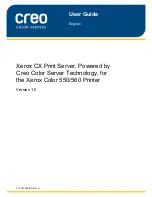
Express5800/320F
Next-GeNeratioN Fault toleraNt Server
Key Benefits
Continuous availability for
»
99.999%
system uptime
Affordable fault tolerance using Intel Xeon based technology
»
Hardware redundancy of all components
»
Enhanced Processing Performance
The Express
5800
/
320
F FT server features Quad-Core Intel Xeon
processors, achieving a
20%
performance gain over existing fault
tolerant servers.
Virtualization Operating System Support
Virtualization software support allows for multiple guest operating
systems to run in a single physical server, simplifying server
consolidation and migration. Application failure risk may increase
in virtual environments if the server hardware fails, because all of
the applications in the virtual environment will be affected. With
Fault Tolerant servers and their redundant modular architecture,
the risk of these applications going down is eliminated due to the
server’s continuous computing capability.
Reduction in Maintenance Time
The optional Active Upgrade
™
splits the FT server into two
independently running systems and allows one of the systems
to run critical applications without interruption while Windows
security patches and program updates are being installed on the
other system.
Servers for Mission Critical Applications
NEC Fault Tolerant (FT) servers provide an innovative solution
to address planned and unplanned downtime for mission-critical
IT infrastructure worldwide. The Express
5800/320
F server
delivers exceptional uptime through dual modular hardware
redundancy featuring Quad-Core Intel
®
Xeon
®
processors. These
servers provide high availability through hardware redundancy
in all components: CPU, memory, I/O, hard disk drives, and
cooling fans.
The heart of this dual modular architecture is the GeminiEngine
™
chipset, which is designed to enable “lockstep” processing.
Lockstep enables the processing of the operating system
and application software on both modules concurrently,
eliminating potential downtime if a hardware component fails on
either module.




















